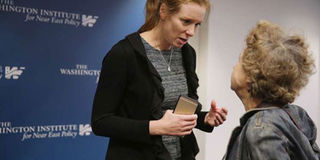Social media is here to stay so embrace it

Facebook Head of Policy Managment Monika Bickert (left) speaks with audience members following a discussion session about 'Internet Security and Privacy in the Age of Islamic State' at the Washington Institute for Near East Policy on February 26, 2016 in Washington, DC. PHOTO | AFP
What you need to know:
- Just last week, our neighbour to the west, Uganda, switched of the social media and mobile money platforms, at a time when the country needed them most.
- With Internet and social media surveillance in Uganda and other countries, citizens get concerned because Facebook and Twitter, as well as third-party mobile phone applications offer geolocation functionality, which may add location to a users’ content including a tweet, Facebook update or a picture.
In the Internet era, some governments have found many ways to control the flow of information — or at least to try to do so — by interfering with digital communications or limiting them. Just last week, our neighbour to the west, Uganda, switched of the social media and mobile money platforms, at a time when the country needed them most.
Some Ugandans used VPNs, or virtual private networks, to bypass the blockages and tweet about the shutdown and share their views on the election, results of which are doubted by some.
The Uganda Communications Commission (UCC), a government arm set up as a regulator of the telecommunications industry, has often been let loose to abuse digital freedoms in the country. Some few years ago, Uganda government had asked Facebook to share data on all Ugandans registered on Facebook, a request that Facebook turned down.
Like in Kenya and many other countries, mobile phone SIM cards are registered in Uganda. The government stealthily tracks the mobile money transactions on these registered SIM cards.
Through UCC, the government also monitors phone communication and user generated content over the internet, especially through the social media plat forms. Individuals on the government’s spotlight include members of the opposition and civil society, as well as journalists and other activists.
User-generated content (UGC) refers to internet content (text, images, videos and sound clips) that is created and uploaded to the internet by users usually for no explicit financial gain, but rather for enjoyment or passion.
INTERNET FORUMS
UGC is created virtually by anyone. It includes blogs, video clips, audio clips (podcasts), as well as comments on internet forums, or status updates on social networks like Facebook or Twitter.
UGC played an important role in the protests and uprisings in the Middle East and North Africa, and Uganda may have borrowed a leaf from these countries to switch of the internet. About 40 countries filter specific Internet sites or services, as China does by prohibiting access to some foreign news sources.
With Internet and social media surveillance in Uganda and other countries, citizens get concerned because Facebook and Twitter, as well as third-party mobile phone applications offer geolocation functionality, which may add location to a users’ content including a tweet, Facebook update or a picture.
In addition, all mobile phone users are constantly having their position triangulated and often recorded by their mobile operator. If there is an unregulated or difficult relationship between the state and mobile operators, the usage of the mobile internet can actually enhance the surveillance capabilities of repressive regimes.
Automated Internet surveillance computers sift through the vast amount of intercepted Internet traffic, filtering out, and reporting to investigators those bits of information which are “interesting”, for example, the use of certain words or phrases, visiting certain types of websites, or communicating via email or chat with a certain individual or group.
In March 2013, Reporters Without Borders issued a special report on Internet surveillance that examines the use of technology that monitors online activity and intercepts electronic communication in order to arrest journalists, citizen-journalists, and dissidents.
The report includes a list of “State Enemies of the Internet”, Bahrain, China, Iran, Syria, and Vietnam, countries whose governments are involved in active, intrusive surveillance of news providers, resulting in grave violations of freedom of information and human rights.
Internet surveillance is going to be a difficult task for the governments that attempt to do so. Firstly, these countries will have a bad image on the global map. Secondly, it is very expensive to switch off internet even for an hour as many services now rely on the internet.
Lastly, as we have seen in the case of Uganda, people have learnt of ways to circumvent the routes that governments usually use to mute social media platforms by using secure communication channels.
Wambugu is an Informatics Specialist. [email protected]. @samwambugu2





